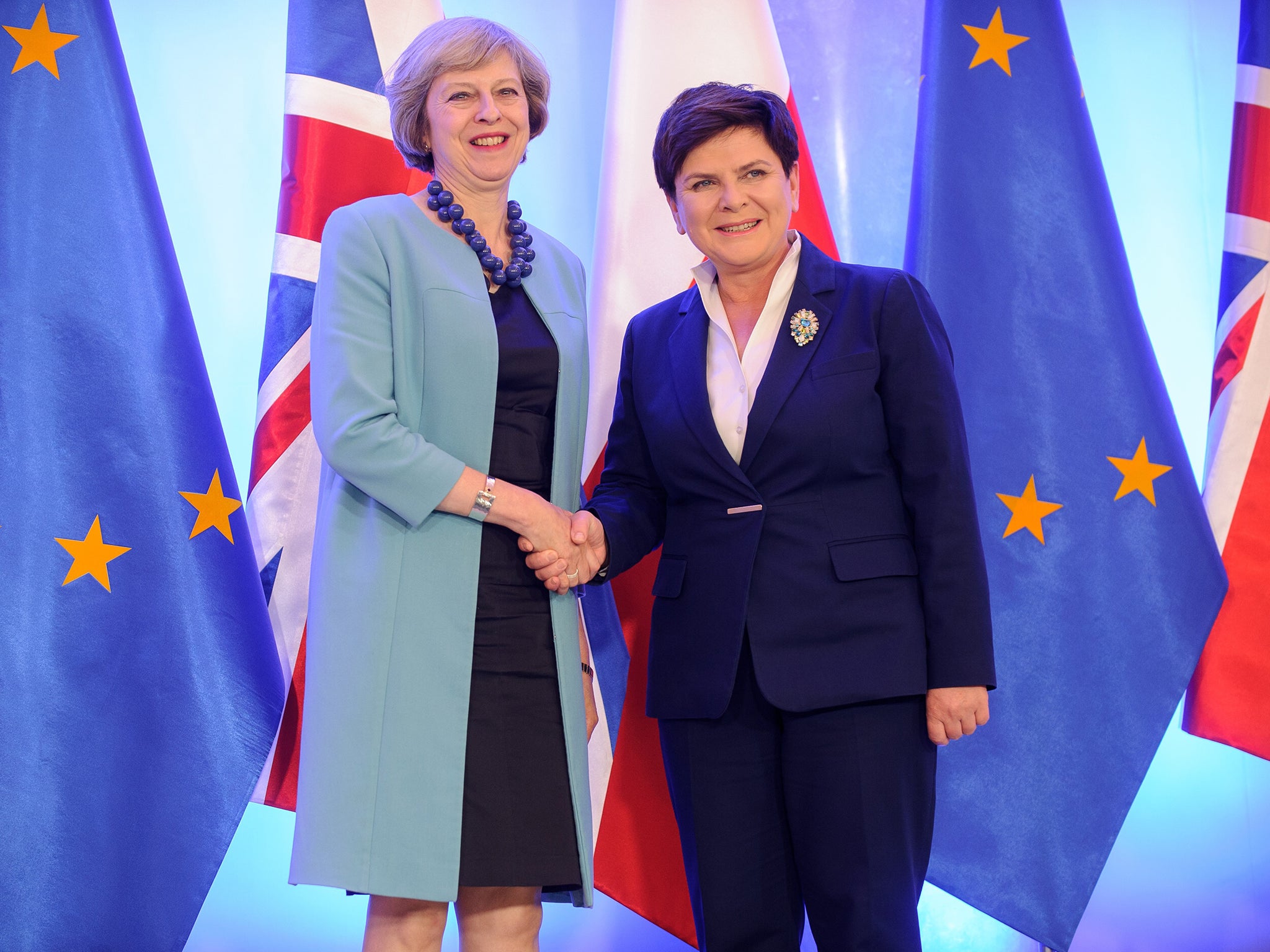Brexit deal must protect the rights of one million Poles in Britain, PM warned
Theresa May met her Polish counterpart, Beata Szydlo, at Number 10 to discuss Britain's imminent departure from the European Union

Your support helps us to tell the story
From reproductive rights to climate change to Big Tech, The Independent is on the ground when the story is developing. Whether it's investigating the financials of Elon Musk's pro-Trump PAC or producing our latest documentary, 'The A Word', which shines a light on the American women fighting for reproductive rights, we know how important it is to parse out the facts from the messaging.
At such a critical moment in US history, we need reporters on the ground. Your donation allows us to keep sending journalists to speak to both sides of the story.
The Independent is trusted by Americans across the entire political spectrum. And unlike many other quality news outlets, we choose not to lock Americans out of our reporting and analysis with paywalls. We believe quality journalism should be available to everyone, paid for by those who can afford it.
Your support makes all the difference.The rights of Polish citizens in Britain will be the “most important matter” for its government in the Brexit talks, Theresa May has warned, as she confirmed plans to deploy British troops to Poland.
Beata Szydlo, Poland’s Prime Minister, stressed the need to maintain “guarantees” for up to one million Poles in this country following talks in Downing Street. Ms May has refused to confirm their rights, insisting that the Government must not “reveal its hand” ahead of the Brexit negotiations, which will begin when she triggers Article 50 next year.
That has prompted accusations that they are being used as ‘bargaining chips’ in the EU exit talks – after Trade Secretary Liam Fox described them as “one of our main cards”.
Ms Szydlo added: “The most important matter from our point of view is that guarantees are maintained for Polish citizens that live and work in the United Kingdom.” However, the Polish Prime Minister backed Ms May’s argument that there must be “reciprocity” – that the rights of British citizens in other EU countries must also be confirmed.
Ms May stressed how both the UK and Poland remained committed to continuing sanctions against Russia until it abides by the Minsk peace deal in Ukraine. And she announced plans for a bilateral defence treaty – part of efforts to cement defence links with Poland, as uncertainty over Brexit continues.
However, the British Prime Minister dodged a question about whether Britain would attempt to use its military muscle to try to secure a better Brexit deal with Poland.
Earlier, Defence Secretary Michael Fallon said such a move would be “a little cynical”, insisting there were mutual benefits for countries such as Poland. Sir Michael said: “This is a glimpse of the future, of how we will be deepening our country-to-country relationships with key partners in Europe.
“Right across the board, on exports, on trade, on research, and also on defence and security.” He added: “We are the leading European player in Nato, we are a major export market for the Poles themselves – in fact, Britain is Poland’s third largest export market.”
At the press conference, Ms May sought to squash newspaper claims that she is losing sleep over Brexit, saying: “I think there has been a little bit of over-interpretation about sleepless Brexit nights, I have to say.”
Ms Szydlo said, “Brexit will be an interesting experience for all the member states, but that’s in the future,” insisting talks could not begin until the Article 50 notice was triggered next year.
Ms May’s official spokeswoman was forced to retract a suggestion that intelligence-sharing could form part of Brexit negotiations with the EU.
Number 10 clarified that information was shared by security services on the basis of bilateral agreements between countries, so could not form part of the Brexit negotiations.
But the sharing of data through Europol, the EU law enforcement body that handles criminal intelligence, would be part of the talks.
The two leaders confirmed the deployment of 150 British troops to Poland as part of the Nato measures to provide support for the country amid concerns about Russian military activities.
Soldiers from the Light Dragoons regiment in Catterick, as well as a number of armoured vehicles, will be stationed in north-east Poland, close to the border with the Russian enclave Kaliningrad, in April 2017.
Join our commenting forum
Join thought-provoking conversations, follow other Independent readers and see their replies
Comments